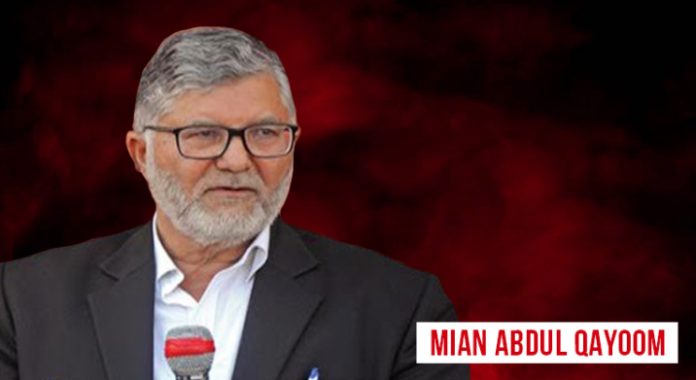Srinagar, Jun 25: Mian Abdul Qayoom, former president of the Jammu and Kashmir High Court Bar Association, was arrested by police on Tuesday for his alleged involvement in the murder conspiracy of fellow advocate Babar Qadri in 2020, officials here said.
Click here to connect with us on WhatsApp
Qayoom, a prominent figure in Kashmir associated with the All Party Hurriyat Conference and the banned Jamaat-e-Islami, was taken into custody after the State Investigation Agency (SIA) of the Jammu and Kashmir Police collected evidence against him, the officials said.
Qadri, a human rights expert who frequently appeared on television debates, was fatally shot at his residence in the Hawal area of downtown in September 2020. He had narrowly survived an assassination attempt in 2018.
The officials said Qadri’s killing was a testimony to the fact that dissent within the bar association was dealt with by bullets. The slain lawyer, in his various speeches and posts on social media, had questioned the legitimacy and role of Qayoom.
In a video on September 24, 2020 — the day of his murder — Qadri alleged that Qayoom used militant threats and forced his rivals to withdraw from bar association elections.
Qayoom, who rose to prominence in the legal community by serving in the High Court Bar Association, has been accused of using intimidation, threats, protests and violence to maintain control over it, which he considered his personal domain, the officials said.
During the investigation, Qayoom emerged as the primary suspect behind the murder conspiracy. He was later shifted to Jammu where he will be produced before a designated court on Wednesday, they said.
In January, the high court transferred the case to a Jammu court from Srinagar, saying, “For a fair and impartial trial of a criminal case, it is imperative that the witnesses are in a position to depose in an atmosphere, which is free and not hostile.”
The high court order came on an application moved by the SIA, saying no lawyer from Srinagar was willing to render legal assistance due to the involvement of some influential lawyers based in Srinagar.
Qayoom is the father-in-law of Jammu and Kashmir and Ladakh High Court judge Justice Javed Iqbal Wani.
In August 2022, the police conducted searches at Qayoom’s residences and those of two other lawyers in Srinagar, seizing various digital devices, bank statements and documents, as part of the ongoing probe.
Last September, the SIA announced a reward of Rs 10 lakh for any information leading to solving Qadri’s murder.
The police had alleged the involvement of Saqib Manzoor, a Lashkar-e-Taiba commander, in Qadri’s killing. Manzoor was killed during a police encounter in Srinagar alongside another militant commander in 2022.
Qayoom is also facing probe in various cases, including alleged grabbing of temple land. He is named as an accused in five criminal cases.
Throughout his career, Qayoom has been a vocal proponent of Kashmir’s merger with Pakistan, utilising tactics such as intimidation, protests and violence to further his agenda.
His influence within the High Court Bar Association has been described as a personal fiefdom, with Qayoom manipulating events and inciting unrest to maintain control, the officials said.
From boycotting elections to openly supporting terrorism, Qayoom has consistently pushed for separatist ideals, leading protests and making inflammatory statements against the Indian government.
His involvement in various controversial incidents, including the Amarnath land row and allegations against security forces, have stirred up tensions and contributed to a volatile atmosphere in the region.
His actions have had far-reaching consequences, impacting businesses, livelihoods and the overall stability of Jammu and Kashmir.
Despite facing legal challenges and backlash, Qayoom continued to align himself with secessionist groups and promote anti-India sentiments.
His involvement in controversial events, such as protests against the hoisting of the national flag, fuelled tensions in the region in the past.
His relentless pursuit of secessionist goals not only polarised communities but also drew international attention to the unrest in the region. (Agencies)


